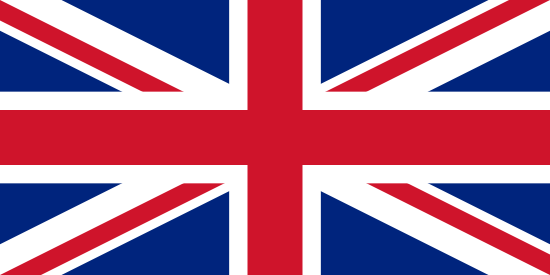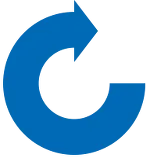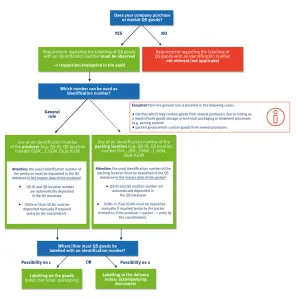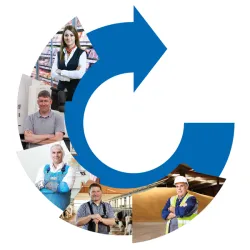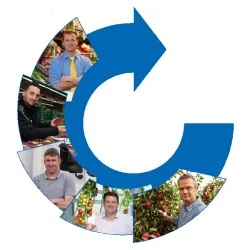The blue QS certification mark symbolizes…
Shared responsibility
The circle symbolizes the commonality and solidarity of all partners in their responsibility for the product. Only when the safety of a food product has been conclusively confirmed across all stages and partners may it bear the blue QS certification mark. The blue colour stands for freshness and hygiene.
Consistent quality assurance
The arrow conveys the focus on the common goal: consistent quality assurance for safe food from farm to shop. And it indicates that it goes even further: because after the purchase - during transport, storage and preparation of fresh food - the responsibility for quality assurance lies with you, the consumer.
Cross stage scheme
The stages in the circle represent all the groups involved in the production and marketing of food: Feed producers, farmers, slaughtering and deboning plants, processing companies, wholesalers, food retailers.
FAQ - Introduction of new QS company logo vs. use of the QS certification mark
The most important questions and answers on the use of the QS certification mark and the new QS company logo
Yes, the blue QS certification mark can be used by authorized QS scheme participants both for the illustration on QS certified goods and on packaging materials, delivery notes and shipping documents as before. In addition, the use of the QS certification mark for scheme participants without direct product reference in online communication, as an element in business stationery (letterhead, image brochure, etc.) and on advertising materials of all kinds is still permitted.
Please note that advertising material, packaging material, stationery or similar advertising media on which the QS certification mark is to be displayed must be approved by QS before going to print. The exact specifications for the use of QS certification mark can be found in the QS style guide (for the QS certification mark) or in our FAQs on the use of the mark.
No, nothing changes for QS scheme participants. The new company logo introduced by QS on April 1, 2023 will be used exclusively by QS employees for correspondence with scheme participants, service providers, media representatives, interest groups, cooperation partners. Additionally, it will be used by QS for marketing campaigns as well as for the dialog with consumers.
Yes, the familiar blue QS certification mark will continue to be used to label fresh meat and meat products, ham and fresh fruit, vegetables, potatoes, which are produced and marketed in compliance with QS's mandatory quality requirements.
QS certification mark - Further FAQs
The mark QS-approved laboratory can be used in the area of a document that contains the name, logo or address of the laboratory.
However, make sure that the mark is not displayed too prominently in test reports (e.g. regarding the position and size) that have no connection with the QS scheme. The mark QS-approved laboratory should not be larger than your own company logo. If necessary, you can use the accreditation logo's size and position as a guide in this respect. It must be avoided that if the mark is too large, it will be overlooked that the header only shows the range of services of a laboratory in general, independent of the actual laboratory services.
No, laboratories are not allowed to use the QS certification mark. The QS certification mark should only be used to label products from the QS scheme.
An own mark QS-approved laboratory
has been developed for laboratories, which laboratories can use to draw attention to their activities in the QS scheme and advertise their activities.
Prior to publication of media or advertising material bearing the QS certification mark, drafts of printed media or screenshots of online communication must be sent to QS Qualität und Sicherheit GmbH for approval and release. Please use the online form at Contact form - Use of QS certification mark - Approval request to request approval for the use of the certification mark. If you use the online form, you can be sure that we have all the necessary documents and information to process your request.
So that QS goods can be assigned to the shipping documents at any time and without doubt, QS goods must be clearly identified as such in the shipping documents. It is important for the labelling to be product-related. For example, product identifications in the shipping documents can be indicated with the addition QS
(apples (QS) or QS apples). It is also possible to ensure the clear assignment of QS goods via general agreements or the use of synonyms. The procedure must be documented by the respective companies and known to the employees concerned.
Using the QS certification mark in the header or footer of the delivery note is not sufficient for the labelling products as QS goods.
Further information on the subject of Labelling of QS goods
can be found in the Supporting document "Fruit, vegetables, potatoes: Labelling of QS produce".
Since January 2020, QS goods in the QS supply chain fruit, vegetables and potatoes must be labelled with an identification number of the producer deposited in the QS database. In certain cases, an identification number of the packing location deposited in the QS database can be used instead of the producer number.
The labelling can be done either directly on the label of the goods (or box label) or in the delivery notes/accompanying documents.
The following figure clearly shows the requirement (Please click on the picture to enlarge).
You can use the mark QS-approved laboratory
on test reports, even if they do not contain any QS-related parameters.
Whether it is meat, meat products, fruit, vegetables or potatoes – food with the QS certification mark has an accurately documented and monitored lifecycle. Therefore, the way of a piece of meat from animal owner via abattoir and butcher, and for fruit and vegetables from producer via wholesaler, to the shop is clearly traceable.
QS. Quality scheme for food covers all stages of the food chain. Strict rules apply to all participating companies in Germany and abroad, for example regarding traceability and hygiene. Auditors and independent certification bodies check regularly whether all requirements are met.
The most important QS requirements at a glance:
Meat and meat products:
Food retail
The optimal storage and handling of goods in the supermarket ranks among the most important QS requirements. To ensure compliance with the cold chain, the supermarket staff has to check the temperature of goods regularly. In all areas of the market, high standards of cleanliness and hygiene must be observed and specification regarding staff hygiene must be implemented. Regular staff trainings ensure that all hygiene requirements are adhered to.
Meat processing
Livestock must be slaughtered in compliance with animal welfare standards. Strict hygiene rules apply to meat processing companies. In addition, the goods must be constantly cooled, appropriately packed and clearly labelled as well as properly stored.
Livestock transport
Only QS certified livestock transport companies are allowed to transport livestock. During transportation, animal welfare and safety have the highest priority. The transportation companies must check the animal welfare regularly and make sure that the livestock is supplied with sufficient fresh air and adequate space.
Livestock owners
The humane treatment of animals, regular visits by a veterinarian as well as hygiene checks and the responsible use of veterinary drugs rate among the most important QS requirements for livestock owners. Additionally, livestock owners may only feed their livestock with feed from QS certified feed producers.
Feed producers
Feed producers may only use flawless raw ingredients. They must continually conduct hygiene checks and must avoid any type of contamination. Goods must be regularly analysed for residues of heavy metals, plant protection products and pollutants. In addition, the feed must be properly stored.
Fruit, vegetables, potatoes
Food retail
Incoming goods inspections ensure that only top quality QS produce reaches the stores. Correct labelling, optimal storage and handling of goods rank among the most important QS requirements. This includes also the compliance with cooling regulations. In addition, it must be guaranteed that high standards of cleanliness and hygiene are observed in all areas of the store and that specification regarding staff hygiene are implemented. Staff trainings on QS requirements take place regularly.
Wholesale
Incoming and outgoing goods inspections ensure that customers only receive flawless QS produce. To avoid contaminations, fruit and vegetables may not touch the ground or walls during storage. All requirements regarding cooling must be met and have to be checked regularly by means of temperature controls. High standards of cleanliness and hygiene must be observed. Samples of the goods are taken on a regular basis and are analysed for residues of plant protection products.
Fruit and vegetable producers
In the cultivation of fruit, vegetables and potatoes, planting materials, water quality, fertilization and the use of authorized plant protections products are monitored. During harvesting and transport of the produce, high hygiene standards must be observed. A high level of work safety for workers prevails in all areas. Regular residue analyses in laboratories are carried out in order to check that only authorised plant protection products are used in the required quantity.
Products with the QS certification mark are offered in more than 25,000 markets for food retail food. These include supermarkets and department stores as well as branches of discounters. You will recognize the products based on the blue QS certification mark on the packaging or on the basis of a labelling at the deli counter. You should also pay attention to the product information in brochures and advertisements of the food retail.
The QS scheme has no influence on the product price: Thus, products with the QS certification mark do not necessarily cost more than products without the mark.
The QS certification mark can be found on many fresh foods in over 25,000 food retail markets, such as on meat, meat products and cold cuts as well as on fresh fruit, vegetables, potatoes and kitchen herbs that are offered fresh. German as well as foreign products can be labeled with the QS certification mark. Other foods - such as milk, fish and eggs - however bear no QS certification mark. In principle, only products that have been produced and marketed according to the requirements of the QS scheme may be labelled with the QS certification mark.
Further information about the QS certification mark can be found here.
The QS certification mark may only be used by QS Qualität und Sicherheit GmbH scheme participants and their subsidiaries, by authorized certification bodies and coordinators and approved laboratories. They are awarded the right to use the mark individually by means of a scheme contract or framework agreement with QS. Agricultural businesses and food retail branches do not make any direct contractual agreements with QS; they participate in the QS scheme via coordinators. The right to use the QS certification mark is awarded to them individually and on request by their coordinator.
With signing the scheme contract or framework agreement, you are authorised to use the QS certification mark in your communication and to promote your certification and commitment to food safety. The same applies if you want to advertise the availability of QS certified goods in your product range and if you support the QS scheme.
In addition to the advertising communication, you can also use the QS certification mark on delivery notes and accompanying papers. Furthermore, the certification mark can be used in online communications, as an element in the business equipment (letterheads, brochures etc.) or on any advertising material.
After signing the scheme contract or framework agreement, you are given the QS style guide that outlines the rules for the use of the certification mark on delivery and accompanying documents or without direct reference to a product. You will also receive individual login data for accessing the protected area of the QS website (www.q-s.de/account/de/login/) reserved for users of the certification mark. Printable data can be downloaded there. Bundled businesses receive the print data from their coordinators.
Contact
Sonja Pfeifer
Senior Manager Contracts, Use of certification mark- Tel: +49 (0) 228 35068-136
- Fax: +49 (0) 228 35068-16136

